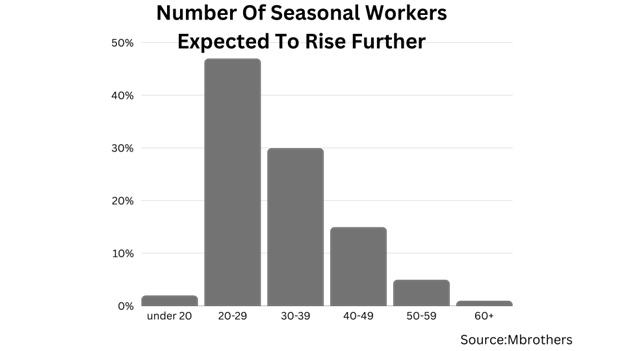People with seasonal jobs face a big challenge – their income goes up and down a lot depending on the season. Summer resort workers make more in the summer. School bus drivers make more during the school year. Unsteady cash flow makes budgeting and saving challenging. When work slows down, paying for basics like rent and food can get tough.
Loans can help even out the income peaks and valleys. But they come with risks too. This article will look at how loans work for seasonal workers. The goal is to help seasonal workers manage money through income ups and downs.
Financial Challenges Faced By Seasonal Workers
Unpredictable Income Cycles
Income can fluctuate dramatically between peak season and off-season. Irregular cash flow makes budgeting and managing finances difficult.
Difficulty Saving
With income going up and down, seasonal workers struggle to save money for emergencies and financial goals. Little savings means fewer resources to draw from when income dips.
Trouble Qualifying For Loans
When income is inconsistent, seasonal workers often have a hard time qualifying for traditional loans and credit. This limits their options when they need funds.
Stress & Uncertainty
Not knowing whether they can cover costs in the off-season causes stress and financial strain. This uncertainty can impact their well-being.
Financial Solutions For Seasonal Employment
Seasonal workers have up-and-down incomes because their work follows busy and slow seasons. This makes it hard to budget and save money. When work slows down, seasonal workers can struggle to pay for basics like food and rent.
Various financial solutions can assist seasonal workers in managing the income rollercoaster. Loans allow them to borrow money to cover costs during lean times. Credit cards can also smooth spending, but their high interest rates make loans a better option. Building emergency savings is wise to limit loan needs.
Loans can help people with seasonal jobs handle the ups and downs in their pay.

Some common types of loans tailored to seasonal workers are:
- Lines of credit – Let you take out funds as you need them when income drops.
- Personal loans – Provide a lump sum to bridge income gaps when money is tight in the off-season.
Key factors in choosing a loan are the repayment timeline, interest rate, and fees. Low rates and reasonable terms help. Workers should only borrow what they need to avoid too much debt.
Financial education programs also empower seasonal staff. Learning budgeting, saving, and wise borrowing helps them take control of their finances. With the right mix of solutions, seasonal workers can gain stability despite ups and downs. While loans can be helpful, seasonal workers with fluctuating incomes need to exercise caution.
Personal Loan Pre-Approval Can Benefit Seasonal Workers
- Going through the pre-approval process can give you an estimate of the loan amount, interest rate, and repayment terms you may qualify for based on your credit history and income.
- It saves time when you are ready to apply. Once pre-approved, you can complete a full loan application more quickly, as the lender has already vetted your background. This makes the final loan approval faster.
- Coming to personal loan lenders with a pre-approval letter in hand shows you’re a serious, qualified borrower. This can give you more leverage to negotiate for better loan terms.
- Validates your creditworthiness. Getting pre-approved indicates you are in good shape to qualify for a loan. This can give you the confidence to move forward with a major purchase or project.
- Requires a soft credit check. Pre-approvals usually only require a soft inquiry, which does not affect your credit score. The hard inquiry comes later with the final application.
The pre-approval process can be quick and straightforward. It’s worth considering to better understand your options and set the stage for a smooth final loan application. Just be sure to compare multiple lenders to find the best rates and terms.
Seasonal Income Stability Strategies
Some jobs rely on certain seasons for work and income. Construction workers, landscapers, ski instructors, and others earn the most during busy months but considerably less in the off-season. This unstable income can make budgeting and saving very challenging. There are strategies to find income stability despite seasonal work.
In the off-season, look for temporary gigs or part-time work to replace some lost earnings. Tutoring, retail, delivery driving, or freelance projects are options. Save aggressively during peak seasons so you have reserves for the slow months. Create a budget plan for seasonal ups and downs. Limit expenses and discretionary spending when you know lean times are coming.
Consider ways to expand your in-demand services year-round. Offer landscaping clean-ups in winter or private ski lessons in summer. Through planning and discipline, it’s possible to stabilize income across seasons, reducing financial stress. The key is to prepare for those unavoidable ebbs in seasonal work to prevent them from devastating your finances.
Key Points
- Loans bridge income gaps but must be repaid with interest.
- Borrowing too much can lead to overwhelming debt.
- Late payments hurt credit scores, which creates future problems.
- Weigh risks before borrowing, and only take reasonable loan amounts.
- Use loans as a temporary bridge and build savings during peak seasons.
While loans enable seasonal workers to maintain stability between income cycles, exercising caution and proper financial planning is essential to avoid spiraling into debt.
FAQs
- What are some common seasonal jobs?
Some examples of seasonal jobs include construction and landscaping. Ski resorts, summer camps, holiday stores, and farms also hire seasonal staff. Some people work as tax preparers during the holiday season. The busy seasons vary across professions.
- How can I prepare financially for the slower seasonal months?
Save aggressively during your peak earnings months. Build an emergency fund to tap into during slow seasons. Create a budget plan that accounts for fluctuating income. Limit discretionary spending and watch expenses closely during slower months.
- What part-time work can supplement off-season income?
Consider temporary gigs like retail, restaurant work, tutoring, delivery driving, freelance projects, administrative work, etc. Choose options with flexible schedules that work around your main seasonal job. The key is bringing in supplemental earnings during slow periods.
Conclusion
I know firsthand how stressful it can be when your income rises and falls with the seasons. As a landscaper, my busy spring and summer months pay the bills. But when winter hits, work dries up and money gets very tight.
Taking out loans can help even out cash flow so you can cover costs during slow seasons. But borrowing too much often makes things worse in the long run.
My advice is to learn about budgeting and smart borrowing. Compare interest rates and fees so you don’t get ripped off. Only borrow what you truly need in the short term. Use loans as a temporary bridge, not a permanent solution.
Saving up cash during your busy months also goes a long way. Even small amounts add up over time.
With some planning and discipline, we seasonal workers can smooth out those financial ups and downs. We gain more security to pay our bills on time and reach our financial goals. It just takes being smart with what comes in and goes out. I’m happy to share more about what has worked for me. We’re all in this together!








No Comments